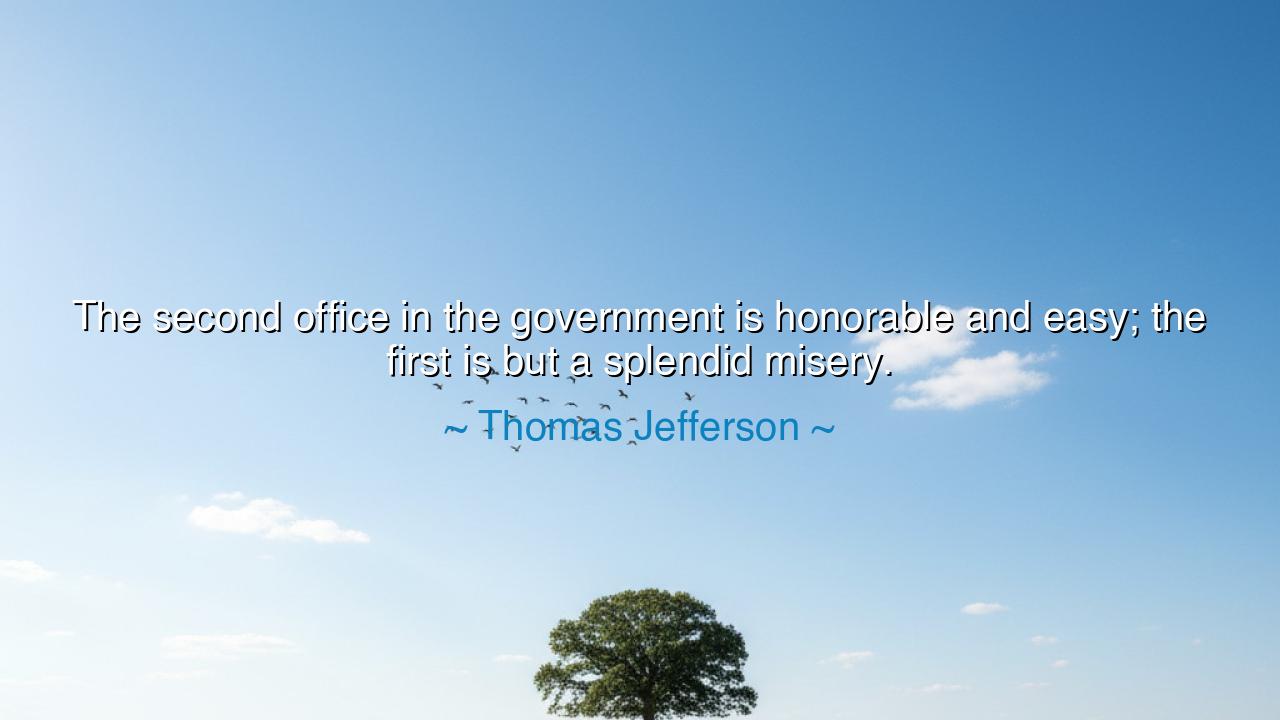
The second office in the government is honorable and easy; the
The second office in the government is honorable and easy; the first is but a splendid misery.






“The second office in the government is honorable and easy; the first is but a splendid misery.” Thus wrote Thomas Jefferson, one of the architects of liberty, a man who had tasted both the triumph and the torment of power. His words, elegant and mournful, reveal the dual nature of leadership — that the crown of authority gleams with glory, but weighs heavily upon the soul. In this single line, Jefferson captures the eternal paradox of governance: that the closer one stands to greatness, the lonelier, more burdened, and more haunted that greatness becomes.
The origin of this quote lies in the early years of the American Republic, when Jefferson, having served as Vice President under John Adams, ascended to the presidency in 1801. As Vice President — the “second office” — Jefferson had found his duties light and his conscience clear. He observed, he advised, and he waited. But when he took upon himself the mantle of President of the United States, he discovered that power, however noble, is also a torment. The nation’s hopes pressed upon him; its divisions tore at his spirit. Every decision carried the weight of millions, every compromise left behind a wound. Thus he called the presidency “a splendid misery” — splendid in honor, but miserable in cost.
When Jefferson speaks of the “second office” as honorable and easy, he does not mean it lacks dignity or worth. Rather, he praises it for being free of the crushing burden of ultimate responsibility. The Vice President could act with integrity and detachment, contributing to governance without bearing the storm. It is the “first office,” the presidency, that turns the laurels of victory into thorns of duty. The higher the position, the greater the peril of conscience. For the one who rules stands alone at the summit, exposed to every wind of conflict and judgment. The splendor of office brings neither peace nor pleasure, only the heavy solitude of those who must decide what others merely debate.
History offers a thousand mirrors to Jefferson’s lament. Consider Abraham Lincoln, who entered office with faith in democracy and left it with the scars of war. The presidency, for him, was truly “a splendid misery.” His greatness came not from ease, but from endurance. He bore the pain of division, the deaths of hundreds of thousands, the hatred of enemies, and even the loss of his own joy. Yet his suffering became the vessel of his wisdom. So it was for Winston Churchill in Britain, and for countless rulers before and after — men and women who discovered that leadership, though gilded in ceremony, is a cross, not a crown.
Jefferson’s phrase also speaks to the deeper truth of the human condition — that all great callings demand sacrifice. To lead, whether a nation or a family or a cause, is to surrender a part of one’s freedom. The leader must often choose between what is right and what is possible, between the good of the few and the good of the many. The “splendid misery” of leadership lies in this tension: that one may achieve glory in the eyes of history, yet suffer loneliness in the eyes of one’s own heart. Great power isolates as surely as it elevates.
Yet Jefferson’s words are not meant to dissuade, but to humble. They remind us that those who seek the highest office — or any form of leadership — must do so not for vanity, but for service. The “splendor” must never outweigh the “misery.” For when power becomes desire, it corrupts; but when power becomes duty, it sanctifies. The true ruler does not rejoice in his authority — he endures it. And in that endurance, he earns the nobility that title alone cannot bestow.
The lesson, then, is timeless: beware the temptation of glory, and respect the burden of responsibility. In every age, people dream of power, yet few understand its cost. To lead others is to be both exalted and bound, to live not for oneself but for all. The wise do not seek greatness; they accept it only when called, and carry it with humility. Whether in government, in business, or in the quiet leadership of daily life, remember Jefferson’s wisdom — that every “splendid” role conceals its own “misery,” and that true honor lies not in the ease of the second office, but in the endurance of the first.
So, O listener, if fate ever calls you to lead, do not fear the misery — embrace it as the price of service. For though the path is lonely and the burden heavy, the splendor of sacrifice shines brighter than any crown. And when your task is done, may you rest as Jefferson did — weary of the weight, yet proud of the work, having learned that greatness is not measured by power gained, but by peace of conscience kept.






AAdministratorAdministrator
Welcome, honored guests. Please leave a comment, we will respond soon